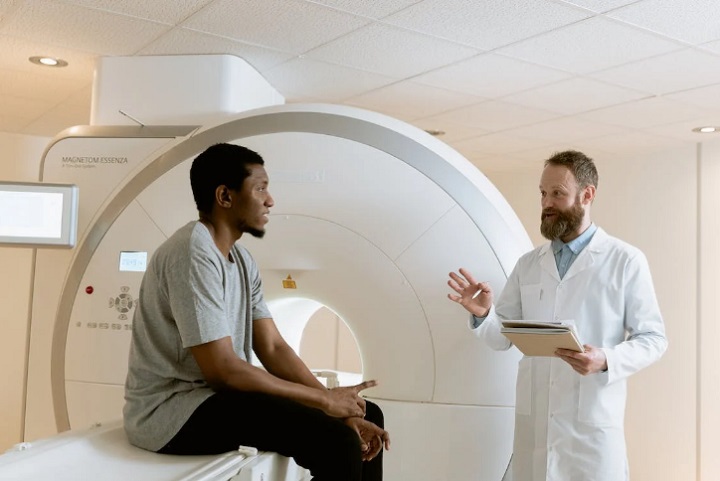In the relentless battle against cancer, technology has emerged as a powerful ally. The fusion of biomedical research with cutting-edge technology is revolutionizing the way we understand, diagnose, and treat this multifaceted disease. With each technological advancement, we move closer to more personalized, efficient, and effective cancer care. From the development of genomic sequencing to the utilization of artificial intelligence in diagnostics, this document will explore eight significant technological breakthroughs that are reshaping cancer research and propelling us toward a future with vastly improved outcomes for patients globally.
1. Radiation Therapy
Radiation therapy has been a cornerstone of cancer treatment for decades, but recent technological advancements have significantly improved its precision and effectiveness. New techniques such as intensity-modulated radiation therapy (IMRT) and stereotactic body radiation therapy (SBRT) utilize computer-controlled machines to deliver highly targeted beams of radiation directly to the tumor site, sparing surrounding healthy tissue. This not only reduces side effects for patients but also allows for higher doses of radiation to be delivered, increasing the chances of eradicating the cancer. The New Mexico Cancer Center provides cutting-edge radiation therapy services utilizing the latest technology and treatment approaches, ensuring the best possible outcomes for patients fighting cancer. Furthermore, advancements in image-guided radiation therapy (IGRT) use real-time imaging to track the tumor’s movements during treatment, ensuring even greater accuracy.
2. Genomic Sequencing
The human genome project, a monumental endeavor, laid the foundation for groundbreaking advancements in cancer research. By enabling researchers to meticulously map out our genetic makeup, it has revolutionized the field. Today, the advent of genomic sequencing technology represents a significant leap forward. This technology empowers medical professionals to delve deep into a patient’s DNA, unraveling specific mutations that underlie their cancer. This level of precision not only facilitates more accurate diagnoses but also enables physicians to tailor treatment plans to target these unique genetic abnormalities. Moreover, genomic sequencing has ushered in a new era of precision medicine, where treatments can be finely tuned to an individual’s distinct genetic profile, aiming for optimal outcomes and personalized care.
3. Immunotherapy
In recent years, immunotherapy has emerged as a transformative treatment option across various types of cancer. This innovative approach harnesses the power of the immune system to combat cancer by either boosting its inherent capabilities or equipping it with new tools to identify and eliminate cancerous cells. Thanks to recent technological advancements, researchers have developed more targeted and potent immunotherapies, leading to enhanced patient outcomes and promising results. For instance, CAR-T cell therapy, a cutting-edge treatment modality, employs genetic modification to bolster the body’s immune response and has demonstrated remarkable success in treating certain blood cancers.
4. Artificial Intelligence
The integration of artificial intelligence (AI) in cancer research is rapidly evolving, offering the potential to revolutionize various facets of cancer care. AI algorithms are adept at analyzing extensive datasets from diverse sources such as patient records, medical images, and scientific literature, thereby detecting patterns and making predictions with remarkable accuracy. This holds the promise of aiding physicians in making precise diagnoses, foreseeing treatment responses, and even pinpointing novel therapeutic targets. In the medical imaging realm, AI-driven technologies have substantially advanced the accuracy of mammography in breast cancer detection, improved the delineation of tumors in radiography, elevated the precision of biopsy procedures through real-time image analysis, and have even enabled predictive analytics in pathology to forecast disease progression with unprecedented accuracy.
Furthermore, AI-powered tools have the capacity to enhance efficiency and minimize human error in critical tasks like medical image analysis and drug discovery, paving the way for more streamlined processes and improved outcomes.
5. Liquid Biopsies
Traditionally, obtaining a biopsy necessitated an invasive procedure, posing challenges for patients. However, the advent of liquid biopsies, which scrutinize biomarkers in bodily fluids like blood or urine, has gained significant traction owing to their non-invasive nature and early cancer detection capabilities. Recent technological breakthroughs have heightened the sensitivity and specificity of liquid biopsies, enabling more precise detection of cancer mutations and drug resistance. This advancement holds the potential to enhance treatment decision-making and overall patient outcomes, heralding a new era in cancer diagnostics and care.
6. Nanotechnology
Nanotechnology is an exciting frontier in cancer research that offers innovative ways to diagnose and treat the disease. At the nanoscale, particles are small enough to interact with cancer cells in unique and potentially more effective ways. For example, nanoparticles can be designed to target cancer cells specifically, delivering chemotherapy drugs directly to the tumor while sparing healthy tissues. This targeted approach reduces side effects and improves drug efficacy. Researchers are also exploring the use of nanotechnology for real-time monitoring of treatment responses, providing valuable insights that can lead to more personalized and adaptive treatment plans.
7. Wearable Technology
Wearable technology has made significant strides in monitoring patient health and improving cancer care. Devices such as smartwatches and fitness trackers, equipped with sensors that track vital signs, can now be used to monitor patients’ physical activity, and sleep patterns, and even detect abnormalities that may require medical attention. This continuous monitoring can alert healthcare providers to changes in a patient’s condition in real time, allowing for early intervention and potentially better outcomes. Moreover, wearables are instrumental in collecting data for long-term studies, providing researchers with a wealth of information that can contribute to the understanding of cancer progression and treatment effects.
8. Health Informatics
The burgeoning field of health informatics is crucial in managing and interpreting the vast amounts of data generated by modern cancer research and treatment. Sophisticated data management systems are essential for storing, retrieving, and analyzing clinical information, enabling researchers and physicians to make better-informed decisions. By utilizing big data analytics and machine learning, patterns and trends within the data can be identified, leading to predictive models that could forecast patient outcomes and guide personalized treatment protocols. This not only optimizes patient management but also facilitates the integration of new research findings into clinical practice, ultimately contributing to the improvement of survival rates and quality of life for cancer patients.
The landscape of cancer research is undergoing a profound transformation, driven by a confluence of technological innovations that have expanded our capabilities in diagnosis, treatment, and preventative care. As we stand on the precipice of a new era in oncology, we see a future where these advancements converge to offer personalized and precise interventions, significantly improving patient outcomes. These eight technologies—ranging from the microscopic precision of nanotechnology to the expansive analysis capabilities of health informatics—represent beacons of hope in a long-standing fight against cancer. With their continued development and integration into clinical practice, we move closer to turning the tide on this global health challenge, armed with an arsenal of knowledge and tools that honor the resilience of the human spirit.




















